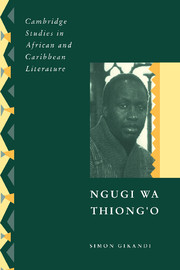Book contents
- Frontmatter
- Contents
- Preface
- Chronology
- 1 Introduction: reading texts and contexts
- 2 Narrative and nationalist desire: early short stories and The River Between
- 3 Educating colonial subjects: the “emergency stories” and Weep Not, Child
- 4 Representing decolonization: A Grain of Wheat
- 5 The poetics of cultural production: the later short stories and Petals of Blood
- 6 Performance and power: the plays
- 7 The prisonhouse of culture: Detained and Devil on the Cross
- 8 The work of art in exile: Matigari
- 9 Writing freedom: essays and criticism
- Conclusion
- Notes
- Bibliography
- Index
2 - Narrative and nationalist desire: early short stories and The River Between
Published online by Cambridge University Press: 09 February 2010
- Frontmatter
- Contents
- Preface
- Chronology
- 1 Introduction: reading texts and contexts
- 2 Narrative and nationalist desire: early short stories and The River Between
- 3 Educating colonial subjects: the “emergency stories” and Weep Not, Child
- 4 Representing decolonization: A Grain of Wheat
- 5 The poetics of cultural production: the later short stories and Petals of Blood
- 6 Performance and power: the plays
- 7 The prisonhouse of culture: Detained and Devil on the Cross
- 8 The work of art in exile: Matigari
- 9 Writing freedom: essays and criticism
- Conclusion
- Notes
- Bibliography
- Index
Summary
Ngugi began his writing career under the pressures of three powerful cultural institutions in colonial Kenya: the Protestant church, which was the major conduit for modern identities in the colonial sphere; the mission school, which, through its valorization of literacy as the point of entry into the culture of colonialism, promoted new narratives of temporality and identity; and Gikuyu cultural nationalism, which manifested itself in the tradition of independent schools that the novelist attended in his youth. For the young Ngugi, each of these institutions held promises of emancipation from the bonds of class and ethnicity, but also presented unexpected dilemmas. One of the major appeals of Protestantism in Central Kenya, for example, was its equation of morality with bourgeois civility: one was not merely a Christian because one believed in a certain doctrine; rather, conversion was apparent in one's ability to live a modern life, a life manifested in a new monetary economy, mode of dress, set of cultural values, and even architecture.
But if Christian conversion was the colonial subject's point of contact with modernity, it also implied a self-swilled dedoublement from a set of cultural values that had been at the foundation of one's communal identity. Conversion implied the negation of a traditional identity in preference for a modern, quasi-European one, and this was not particularly easy for the Gikuyu who, as we saw in the last chapter, were beginning to consolidate their identity in the wake of colonial rule. Ngugi was thus born into a culture that was eager to embrace colonial modernity, but one that had serious doubts about the wisdom of a radical negation of its newly invented collective identity.
- Type
- Chapter
- Information
- Ngugi wa Thiong'o , pp. 39 - 70Publisher: Cambridge University PressPrint publication year: 2000



